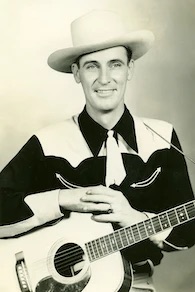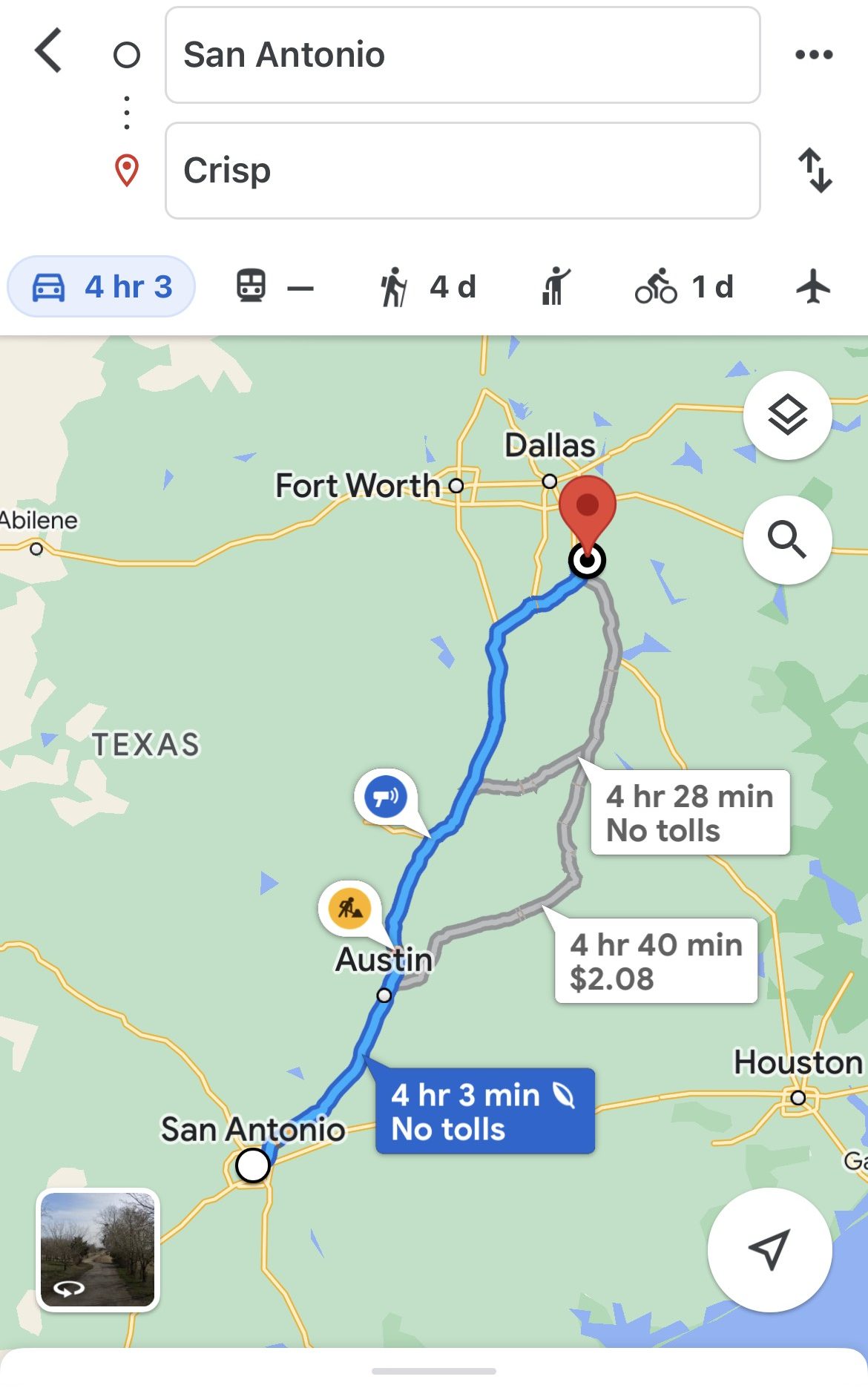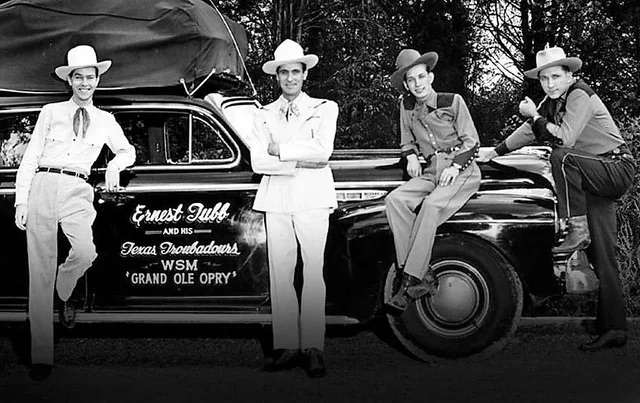
Ernest Tubb was an American musician singer/bandleader who is said to have pioneered country music. Tubb was born on February 9, 1914 on a cotton farm in Crisp, Ellis County, Texas. He got a job as a soda jerk (someone who operates a soda fountain and serves them) in San Antonio as a teenager and taught himself how to play guitar and sing. He then got an unpaid job at KONO radio station where he sang his hero, Jimmie Rodgers’ old tunes. Jimmie Rodgers had a major influence on Tubb’s singing as he was the person that made him interested in it after listening to his recordings in the late 1920s.
Since KONO radio station was located in San Antonio, where Jimmie Rodgers lived when he died, Tubb was befriended by Rodgers’ late wife – Carrie Rodgers. She would listen to his singing and give him professional advice and eventually helped him get a contract with RCA (Jimmie’s old label before his death). In 1940, Tubb got a deal with Decca records after a tonsillectomy rendered him unable to yodel like his idol. At first, he wasn’t selling many records but then he recorded his most famous hit, “Walking the Floor Over You”.

After that, he appeared in many Hollywood movies and became a part of the cast of the Grand Ole Opry show in 1943.
Tubb traveled all over after this big hit, performing and appearing on shows. Soon after, he hired his own band the Texas Troubadours. This group was comprised of other artists including Billy Byrd, Leon Rhodes, Cal Smith, Steve Chapman and more. They became Tubb’s signature band that would provide backup instrumentation for him. However, members of the Troubadours were not consistent as they changed when Tubb hired new people or invited different folks to perform with him.

Why Texas Troubadours?
Troubadour is a term that refers to a traveling song artist -and that’s exactly what Tubb did! He and his band (troubadours) travelled from city to city playing for different audiences and at different venues.
Tubb and Nashville
Although Tubb was born in Texas, he has a strong connection to Nashville, Tennessee. After his first hit, “Walking the Floor Over You” , he got a sponsor from Universal Mills and an appearance on the Grand Ole Opry show in Nashville. He was well received so he did a few more appearances and eventually became part of the show and moved to Nashville.
In 1947, Tubb opened a record shop in Nashville which hosted performances and sold records, mostly country music ones. Many people see the record shop as a physical symbol of country music itself. In addition, Tubb has many connections to the Grand Ole Opry show, the radio show that made him nationally famous. The Opry show was broadcasted over WSM, a country music radio station that used a 50,000 watt channel which broadcasted the Texas Troubadours’ music through the Midwest and South. Tubb owes much of his popularity to the fact that he appeared on that radio station and continued for years afterwards.
His Music Style
After listening to a few of Tubb’s song it is clear to me that there is some type of pattern in his music. He isn’t called the honky tonk pioneer for no reason.
Honky tonk is a style of country music mostly sung in loud, drunken and sometimes violent bars that told of personal joys, pain and heartache. Tubb’s low yet rough and nasal voice was unique in his music and although he was off key at times, he grew to be huge success.
Much of his songs included a solo lead electric guitar that guided the melody of the entire song. The usage of the electric guitar was so that the music could be heard in the loud settings (bars and clubs) where it would be played. A lot of his music speaks about love and heartache. People appreciated the fact that he also spoke of real world experiences and struggles that others could relate to such as divorce, heartache, drinking and rough times.
Tubb also took part in the practice of collaborating and sharing his music with other artists. He would invite lesser known or completely unknown artists to sing and or play with him such as “Hank Williams, Hank Snow and Loretta Lynn” (TSA). He would also put in good words with management from the Opry show and record labels, giving advice to those who needed it at the time. All of these selfish acts help establish Tubb’s reputation as a selfish country singer and garnered lots of respect from those who loved and admired him.
Modernization of Country Music
Although Jimmie Rodgers was his idol and inspiration, Tubb wasn’t able to emulate his style of music for long – especially his signature yodel after a tonsillectomy surgery rendered him unable to do so. As such, Tubb became part of the 2nd generation of country music. Unlike Rodgers’ yodel and folk music style, Tubb had more of a drawl type of sound and many of his songs were almost narrations of relatable scenarios in one’s life. A big way that he modernized country music is because he was apart of its honky-tonk sub genre and was one of the first people to become famous for integrating electric guitar in their music. He realized that once people got rowdy in the bars that they could no longer him the music being played so he adjusted accordingly when he added the string bass and electric guitar to his performances.
Additionally, Tubb advocated for Decca Records to stop using the term “hillbilly” to describe country music as it was perpetuating a negative narrative. Eventually, they replaced it with the terms “country” and “western” which we now know today.
Top Hits
Tubb reached peaked fame in 1940 when he recorded, “Walking the Floor Over You”.
Other hits included “Thanks A Lot” and “Waltz Across Texas”:
Legacy
- He was inducted in the Country Music Hall of Fame in 1965 after recording hundreds of songs.
- There is a building named after him and his band in Nashville called the Texas Troubadour Theatre
- Headlined a performance at Carnegie Hall in New York City
- Has a deeply revered record shop in Nashville (just recently closed down in May 2022)
Sources:
“Ernest Tubb – Country Music Hall of Fame and Museum.” Country Music Hall of Fame and Museum, 6 Dec. 2022, www.countrymusichalloffame.org/hall-of-fame/ernest-tubb.
Fry, Phillip. “Tubb, Ernest Dale”. TSHA, 26 Oct. 2015. www.tshaonline.org/handbook/entries/tubb-ernest-dale.
Staff, Legacy. “Ernest Tubb: The Texas Troubadour”. Legacy.com, 10 Feb. 2012. https://www.legacy.com/news/celebrity-deaths/ernest-tubb-the-texas-troubadour/
Encyclopedia.com. “Tubb, Ernest”. www.encyclopedia.com/education/news-wires-white-papers-and-books/tubb-ernest.
